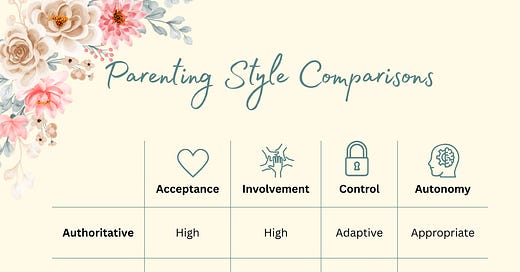The Parenting Style That Actually Works (And Why)
Why warmth + structure is the sweet spot for raising confident, resilient kids.
You’ve probably heard the advice: “Be firm, but kind. Be kind, but firm.” (I even had a suggestion on setting boundaries while using this mantra in my previous post). It turns out that’s more than just good intuition - it’s backed by decades of developmental research.
Among the many parenting styles out there, one continues to shine across cultures, temperaments, and even tricky teen years. In this post, I break down what makes authoritative parenting so effective - and how to make it work in everyday life.
Key Definitions
Let’s talk parenting styles. The classic typology includes four main approaches:
Authoritative: Warm but firm. High expectations, high support.
Authoritarian: All rules, no warmth. "Because I said so" energy.
Permissive: All warmth, no boundaries. Few demands or follow-through.
Uninvolved: Low warmth, low structure. Disengaged or inconsistent.
Out of these, authoritative parenting consistently comes out on top. It’s linked to children who are more self-controlled, emotionally secure, socially responsible, and resilient in the face of stress.
Before we dive into the research, let’s address one of the most common questions I hear:
Gentle Parenting vs. Authoritative Parenting: What's the Difference?
Spoiler: not much.
There’s a lot of talk about gentle parenting right now, and some parents wonder how it compares to authoritative parenting. Here’s the quick answer:
Gentle parenting, when practiced thoughtfully, emphasizes empathy, emotional attunement, and respectful communication.
Authoritative parenting includes all of those things plus firm boundaries, consistent expectations, and guided autonomy.
In other words, gentle parenting done well is authoritative parenting.
What gentle parenting is not:
Permissive parenting (all warmth, no limits)
Passive parenting (letting kids lead without direction)
Harsh or punitive (authoritarian)
The overlap is clear: both styles aim to raise emotionally secure, confident, and well-regulated kids. So if you're practicing gentle parenting with structure, consistency, and age-appropriate expectations - you’re already doing what decades of research says works best.
Research Spotlight
The science is clear: how we parent shapes how kids feel, think, and grow.
A 2020 cross-national study of young people (ages 14–29) across Southeast Europe found that authoritative parenting—warm, responsive, and clear on boundaries—was linked to higher life satisfaction everywhere they looked. In contrast, authoritarian parenting (strict, low warmth) hurt well-being.
A pair of meta-analyses (2017 & 2018) pulled data from hundreds of studies and found the same thing: authoritative parenting leads to better outcomes—fewer behavior issues, better grades, and higher self-esteem—across cultures.
My own research (Dimler et al., 2016) found that supportive parenting boosts teens' self-regulation and identity development, especially when they’re figuring out their independence.
A 2024 study found that maternal warmth was the strongest predictor of teen mental health.
A 2022 study tracked kids from birth and found that responsive parenting in early years predicted higher self-esteem in first grade.
A 2023 study of 7,000 college freshmen found that those with authoritative parents were much less likely to develop depression.
Bottom line: Kids and teens thrive when parents are warm, responsive, and firm—but not harsh. And these benefits last well into adulthood, no matter a child’s temperament.
Why It Matters
Authoritative parenting isn’t just a comfortable middle ground. It’s a developmentally attuned strategy. Why does it work?
It models calm leadership, not control.
It teaches that structure and compassion can coexist.
It adjusts expectations based on the child’s needs and developmental level.
It helps kids internalize values rather than just comply out of fear.
It supports autonomy with guidance, which is key for building resilience.
Essentially, this reflects how we want our kids to treat others - firm, kind, and emotionally grounded.
Long Story Short
Kids don’t need perfect parents. They need present, responsive, and consistent ones. Authoritative parenting offers a foundation where kids feel safe, seen, and supported - and that’s where emotional maturity, academic success, and healthy risk-taking begin.
Quick Takeaways
Gentle ≠ Permissive. Gentle parenting with clear expectations and follow-through is just another way of describing authoritative parenting in action.
Authoritative parenting = warmth + structure.
Backed by global research across diverse families and cultures.
Linked to better self-regulation, confidence, and mental health.
Helps kids understand that boundaries are a form of care.
Not just effective - it’s protective, especially during big developmental transitions.
Being emotionally available, setting fair rules, and showing warmth isn’t just “nice” - it’s protective. The impact lasts well into adulthood.




